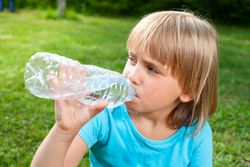What Parents Should Know About Daytime Incontinence in Kids

Also known as daytime wetting, daytime incontinence in children occurs when young ones unintentionally urinate during waking hours. It happens after potty training and affects 3½% of healthy children, 67% of whom wet their beds. If your child recently experienced daytime incontinence, take a moment to learn more about it and what you can do.
Frequently Asked Questions About Daytime Incontinence in Children
What causes daytime wetting?
Physical and behavioral factors account for daytime incontinence in children. Some ignore the urge to urinate because they are busy playing, causing their bladders to become too full and leak. Others may have over or underactive bladders, such as a too-small bladder from a lack of sufficient liquid. Concentrated urine from dehydration also causes your child to urinate more often because it irritates the bladder lining.
 Abnormal kidney and bladder tubes can cause daytime wetting and include symptoms such as weak urine streams and pain while urinating. Dysfunctional elimination syndrome, or when the nerves and bladder muscles are not working in conjunction, causes urine leakages, as does constipation because it puts extra pressure on the bladder.
Abnormal kidney and bladder tubes can cause daytime wetting and include symptoms such as weak urine streams and pain while urinating. Dysfunctional elimination syndrome, or when the nerves and bladder muscles are not working in conjunction, causes urine leakages, as does constipation because it puts extra pressure on the bladder.
What behaviors are associated with it?
If your child has a daytime incontinence issue, they may suddenly need to go to the bathroom. The young one may also urinate more than eight times a day or less than three times a day. Other behaviors linked to daytime incontinence include holding actions, such as squirming or squatting to prevent leaks, and incomplete bladder emptying.
What can I do about daytime incontinence?
Ensure your child drinks six to eight glasses of water a day to stretch the bladder and discourage more frequent urination and bladder lining irritation. Give your child water and diluted fruit juice instead of unhealthy diuretics such as soda, and provide extra underwear. Proper water intake helps by preventing constipation to keep pressure off of your child’s bladder. Lastly, always be patient with your child and use a gentle tone instead of getting angry or upset to prevent further problems.
When should I get professional help for my child?
If your child still has incontinence issues despite your best efforts, schedule an appointment with your local urology specialist to determine the exact cause. Urine tests, abdominal x-rays and examinations, kidney and bladder ultrasounds, and spine and bladder examinations are among the services urologists offer. Provide as much information about the issue as you can to help the urology specialist identify the cause and determine a treatment course.
If you need professional assistance for your child’s daytime incontinence issue, schedule an appointment at Medical Center Urology in High Point, NC. Boarded-certified urologist Dr. Richard Puschinsky has served the region for over 25 years and offers a full suite of services for men and women, including prostate cancer screenings and kidney stone treatment. Call (336) 882-0220 today to make your appointment or learn more about the practice online. Get additional wellness tips on Facebook.
About the Business
Have a question? Ask the experts!
Send your question

